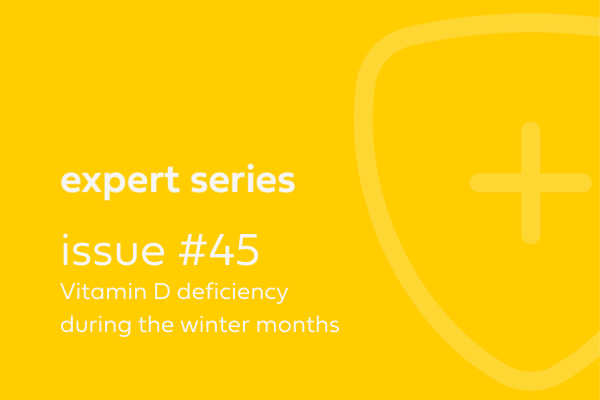Unlocking the Winter Blues: Understanding and Combating Vitamin D Deficiency

As winter approaches, the diminishing daylight and plummeting temperatures heighten the risk of Vitamin D deficiency, a condition often unnoticed but capable of contributing to ailments such as colds, flu, low mood, and persistent fatigue. To shed light on maintaining optimal Vitamin D levels during this season, we spoke to our in-house experts. Read on to explore effective strategies to safeguard your well-being and elevate your health throughout the winter months!
Why is Vitamin D important for our health, especially during the winter months?
Vitamin D has long been known for the important role it plays in bone health, however Vitamin D also has several other important functions in the body, such as:
- helping to maintain muscle function
- immune system function
- for normal cell division.
In more recent years, the role of vitamin D in health has been under the spotlight since research has shown that vitamin D is linked with many other areas of health, and it is now known that a deficiency is associated with a wide range of health problems, including some of the most chronic conditions of modern times.
Vitamin D deficiency is particularly prevalent during the winter months, and this is because production of vitamin D in the body occurs predominantly in response to sun exposure. Lack of sunlight during the winter months means that the majority of people living in the UK are unlikely to achieve even the minimum recommended daily amount of vitamin D in order to prevent a deficiency, according to research.
Unfortunately, it is not possible to rely on the diet alone to obtain adequate intakes either, since very few foods contain vitamin D. Additionally, the form of Vitamin D we get from our food is not fully active and needs to be converted. Even the richest sources are not considered adequate to provide optimal levels, unless you eat multiple portions per day of these foods, which is unrealistic for most people.
Certain groups of people are at high risk of vitamin D deficiency, not only during the winter months, but all year round. These groups include:
- Infants and children under 5 years of age
- Pregnancy or breastfeeding women
- Those who spend a lot of time indoors and city living-where sunlight exposure may be restricted
- The elderly; as the capacity to synthesise the Vitamin decreases with age
- People with dark or covered skin, since vitamin D is not as easily synthesised in the skin when exposed to the sunlight.
- Those with a higher body fat mass and obesity; as vitamin D is deposited in the fat stores, larger areas of fat result in being less bioavailable for the body to use
- People with Inflammatory Bowel Disease (IBS) appear to be at an increased risk, particularly those who have undergone surgery to resection the bowel
- People with kidney and liver disorders disease which impair the absorption of dietary Vitamin D and therefore increase the risk of osteoporosis
- Individuals who take certain medications – vitamin D metabolism may be impaired with certain medications

What are the common symptoms of Vitamin D deficiency, and how can individuals recognise them?
A deficiency of vitamin D can be difficult to notice, this is because symptoms can be very subtle or it can take years for symptoms to become apparent. For some people, symptoms may not occur at all. Likewise, signs and symptoms of vitamin D deficiency can vary from one person to the next, depending on the severity of the deficiency. It is, however, helpful to know what common symptoms to look out for:
- Low mood/ depression
- Fatigue
- Frequent illness or infections
- Muscle weakness
- Aches and pains in the joints and bones
- Slow wound healing
- Hair loss
- Other signs may include bone fragility, loss of muscle tone, and in severe cases a condition called ‘Ricketts’ which affects bone development in children, and in adults, it can cause softening of bone, leading to increased susceptibility to bone fractures.
Status of vitamin D levels can be easily determined by way of a simple blood test.
Since vitamin D deficiency is so widespread, routine testing is thought to be unnecessary, and instead a more cost-effective approach may be to routinely supplement in line with government recommendations, alongside sensible sun exposure where possible during the spring and summer months. However, for those considered high risk it would be recommended that they receive regular screening and be monitored whilst being treated with vitamin D supplementation.
What role does Vitamin D play in supporting mental health, particularly in addressing winter blues or seasonal affective disorder (SAD)?
There is a substantial amount of research that shows vitamin D is linked to mental health, specifically depression and seasonal affective disorder (SAD). Seasonal affective disorder is characterised by a type of depression that typically occurs throughout the winter months and is usually associated with reduced exposure to sunlight. Studies show that people with depression and/or SAD are often deficient in vitamin D or have insufficient levels of vitamin D.
Vitamin D has also been linked with anxiety disorders. Studies have shown that levels of vitamin D are likely to be lower in those with anxiety, according to studies. Furthermore, studies show that adequate levels of vitamin D are associated with a reduction in symptoms of anxiety, and improved sleep quality.
Through research, it has been shown that vitamin D influences many hormones in the body, including the neurotransmitters Serotonin and Dopamine, both of which are directly involved in regulation of mood. Studies have also shown that vitamin D may have a protective effect against depletion of these important neurotransmitters, and that supplementation with vitamin D can increase both serotonin and dopamine levels in the body, helping to alleviate the symptoms associated with these conditions.

What are effective strategies for supplementing Vitamin D during the winter months?
Since vitamin D is such a widespread problem, it is now an official government recommendation for all adults and children in the UK to take vitamin D supplementation during the winter months and for those in ‘at risk’ groups to supplement all year round. In terms of how much of this vitamin is needed is still open for debate. The amount that has been set by the government is determined by age group.
- For babies up to one year, this has been set at 8.5 to 10mcg/day.
- For children aged one year upwards, the recommendation is 10mcg
- For adults up to 25mcg/day.
It is worth bearing in mind that as is the case with most nutrients the ‘Recommended Daily Allowance’ (RDA) or Nutrient Reference Value (NRV) is based only upon the amount that is deemed sufficient to prevent deficiency and/or disease, and not for providing optimum levels. Studies confirm that significantly higher levels than the current RDA are optimally beneficial.
The preferred form in which to supplement is Vitamin D3 (cholecalciferol) as this is the form in which it has been synthesised in the skin in response to exposure to the sun’s ultra-violet rays and is thought to be the most effective.
Both aguulp for gut and aguulp for immunity contain vitamin D in its active form- vitamin D3 (cholecalciferol).
The amount of vitamin D in the aguulp for gut product is in line with UK government recommendations in terms of daily recommended allowances (RDA)/ Nutrient Reference values (NRV) and so can be used to help prevent deficiency and maintain levels, if levels are already adequate.
aguulp for immunity on the other hand, contains larger amounts of vitamin D, and therefore can be considered more of a ‘therapeutic dose’-providing optimal levels, as opposed to the minimum required amount to prevent a deficiency, whilst still being well within the ‘upper safe limit’ range.
Whilst we know that very few foods naturally contain vitamin D, there a certain food that are richer in vitamin D than others which would be encouraged to help top up and/or optimise vitamin D levels in the body, alongside supplementation and sun exposure where possible. Foods that contain good levels of vitamin D include;
- oily fish (such as mackerel, herring, sardines, salmon and trout)
- eggs (particularly the yolks)
- sweet potatoes
- mushrooms
- dairy products and foods that have been fortified with vitamin D such as some breakfast cereals and vegetable oil spreads
References
Vitamin D and health; Scientific Advisory Committee on Nutrition (July 2016)
Sunlight exposure: risks and benefits; NICE Guidance (February 2016)
Nair R, Maseeh A. Vitamin D: The “sunshine” vitamin. J Pharmacol Pharmacother. 2012 Apr;3(2):118-26. doi: 10.4103/0976-500X.95506. PMID: 22629085; PMCID: PMC3356951.
Pfotenhauer KM, Shubrook JH. Vitamin D Deficiency, Its Role in Health and Disease, and Current Supplementation Recommendations. J Am Osteopath Assoc. 2017 May 1;117(5):301-305. doi: 10.7556/jaoa.2017.055. PMID: 28459478.
Martens PJ, Gysemans C, Verstuyf A, Mathieu AC. Vitamin D’s Effect on Immune Function. Nutrients. 2020 Apr 28;12(5):1248. doi: 10.3390/nu12051248. PMID: 32353972; PMCID: PMC7281985.
https://mecp.springeropen.com/articles/10.1186/s43045-020-00043-y
Melrose S. Seasonal Affective Disorder: An Overview of Assessment and Treatment Approaches. Depress Res Treat. 2015;2015. doi:10.1155/2015/178564
Xie, F. et al. (2022) ‘Effect of vitamin D supplementation on the incidence and prognosis of depression: An updated meta-analysis based on randomized controlled trials’, Frontiers in public health, 10.
Mikola, T. et al. (2022) ‘The effect of vitamin D supplementation on depressive symptoms in adults: A systematic review and meta‐analysis of randomized controlled trials’, Critical Reviews in Food Science and Nutrition [Preprint].





